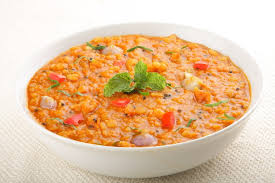 In this week’s parshah, Rebecca gives birth to twin boys. Esau is described as a skilled hunter and Jacob “a wholesome man who dwells in tents.” Returning one day from hunting, Esau is exhausted and very hungry, and Jacob is cooking a stew.
In this week’s parshah, Rebecca gives birth to twin boys. Esau is described as a skilled hunter and Jacob “a wholesome man who dwells in tents.” Returning one day from hunting, Esau is exhausted and very hungry, and Jacob is cooking a stew.
Esau said to Jacob, “Pour into me now some of that very red stuff for I am exhausted.”
The Torah explains that Esau was called Edom (red) from this episode. Why is this detail of the story worthy of mention? Are we told Esau referred to the stew as red to explain why he is later referred to as Edom? Or is he called Edom to forever associate him with this red stew?
Jacob responds that if Esau sells him his birthright, he will give him the stew to eat. Esau agrees, disparaging the value of his birthright and swearing to relinquish it to Jacob once his hunger is sated.
Clearly, we are to understand from the exchange the different personalities of Esau and Jacob, and perhaps even Jacob’s legitimate claim to the birthright, given that it comes with responsibilities and challenges that must be addressed with commitment and purpose and long-term planning – qualities more significant than satisfying one’s immediate hunger.
But why do we need to know that the stew was red?
In Esau’s request to Jacob he uses the Hebrew word “na.” This is usually translated with the sense of immediacy – as in “now” – and it can also mean “please.” But in Exodus 12:9 when the Israelites are given instructions for preparing the paschal lamb, the word “na” is used to mean raw or undone. Gil Marks, an American food writer and historian, who published cookbooks on Jewish food, commented that when cooked, red lentils are no longer red.
By specifying that Esau asked for the very red stuff, we learn that he wanted to eat immediately – even though it was still not cooked. This contributes to our image of Esau as impulsive. He gave up his birthright for immediate gratification, not even willing to wait for the meal to be cooked properly. Such an individual would have no appreciation for the responsibilities of the first born.
Many have the custom of eating red lentil stew or soup on this Shabbat. Here is a recipe, should you wish to try it. Shabbat Shalom
RED LENTIL SOUP – adapted from Norene Gilletz, MealLeaniYumm, p. 81.
1 large onion chopped
4 cloves of garlic minced
3 carrots chopped
2 small zucchini chopped
1 tbsp olive oil
1 cup red lentils
28 oz can diced tomatoes
5 cups water
1 bay leaf
1.5 tsps kosher salt
½ tsp pepper
1 tsp basil
1.5 tbsp lemon juice
Sauté onion, garlic, carrots and zucchini in olive oil in large soup pot. Add in lentils, tomatoes, water, bay leaf and seasonings. Bring to a boil and simmer covered for 1 hour, stirring occasionally, until lentils are soft. Add lemon juice. Makes 8 servings.
Shabbat Shalom!




